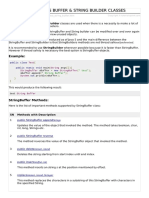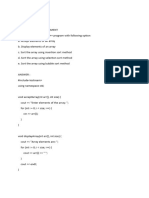0% found this document useful (0 votes)
19 views14 pagesOOPs - Lecture 12 - String Buffer, String Builder
The document discusses the String Buffer and String Builder classes in Java, highlighting their mutable nature and differences from the immutable String class. It explains the constructors and methods of both classes, emphasizing that String Buffer is synchronized and thread-safe, while String Builder offers better performance but is not thread-safe. The document also compares the two classes and provides examples for better understanding.
Uploaded by
nagajyoshna13Copyright
© © All Rights Reserved
We take content rights seriously. If you suspect this is your content, claim it here.
Available Formats
Download as PPTX, PDF, TXT or read online on Scribd
0% found this document useful (0 votes)
19 views14 pagesOOPs - Lecture 12 - String Buffer, String Builder
The document discusses the String Buffer and String Builder classes in Java, highlighting their mutable nature and differences from the immutable String class. It explains the constructors and methods of both classes, emphasizing that String Buffer is synchronized and thread-safe, while String Builder offers better performance but is not thread-safe. The document also compares the two classes and provides examples for better understanding.
Uploaded by
nagajyoshna13Copyright
© © All Rights Reserved
We take content rights seriously. If you suspect this is your content, claim it here.
Available Formats
Download as PPTX, PDF, TXT or read online on Scribd
/ 14
























































































